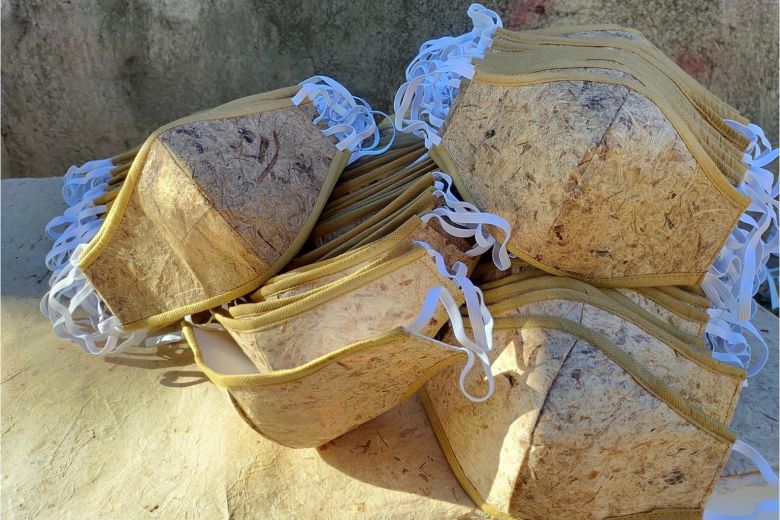Masks Made From Banana-Tree Species Cut Plastic Waste From Covid-19
- Home
- Masks Made From Banana-Tree Species Cut Plastic Waste From Covid-19

Masks Made From Banana-Tree Species Cut Plastic Waste From Covid-19

MANILA (BLOOMBERG) – Fibre from a relative of the banana tree could replace plastic in millions of face masks and hospital gowns the world is making to fight the coronavirus.
Abaca – a fibre from the Philippines used in teabags and banknotes – is as durable as polyester but will decompose within two months, said Philippine fibre agency head Kennedy Costales.
“With this pandemic, if we all buy masks made of synthetic fibre, they will pile up in dumpsites because they take so long to decompose,” said Mr Costales.
Global efforts to ban single-use plastics have retreated as nations prioritised hygiene over the environment for packaging and medical supplies, creating a bright spot for chemical companies such as LyondellBasell Industries and Trinseo.
Sales of disposable face masks are set to rise more than 200-fold worldwide this year to US$166 billion (S$229 billion), according to a United Nations trade article, citing consultancy Grand View Research.
Companies have been reluctant to replace plastic with biodegradable alternatives because of concern about cost and whether the new materials are sufficiently strong and effective for medical use.
A preliminary study by the Philippine Department of Science and Technology showed abaca paper to be more water resistant than a commercial N-95 mask, and to have pore sizes within the United States Centres for Disease Control and Prevention’s recommended range to filter hazardous particles.
Mr Costales said abaca demand could grow exponentially this year, with 10 per cent of production going to medical uses, compared with less than 1 per cent last year.
“Abaca fibre is rapidly gaining popularity as governments and manufacturers all around the world scamper to produce more reusable and safe medical garments for healthcare professionals,” said Mr Pratik Gurnani at, a senior consultant at Future Market Insights.
The Philippines is the world’s largest producer, supplying 85 per cent of the fibre in 2017, according to the latest data from the United Nations Food and Agriculture Organisation. Global production is projected to be worth US$100 million this year, Mr Gurnani said.
The fibre, stripped from the trunks of the abaca tree, was used for saltwater-resistant ship ropes and Manila envelopes in the 19th century. Up to 30 per cent of Japan’s banknotes are made of it and abaca yarn has been used in Mercedes-Benz cars.
Even though the plant fibre is more expensive to produce than plastic alternatives, manufacturers of protective health gear from China, India and Vietnam have placed new orders for the fibre over the past months, prompting Philippine fibre factories to double their output, said abaca exporter Firat Kabasakalli.
“People see this pandemic lasting for some time, so even small companies are trying to make protective equipment, which require our fibre,” said Mr Kabasakalli, general manager of Dragon Vision Trading. “We are getting a lot of inquiries from new clients abroad.”
One company in southern Philippines which makes greeting cards and paper from the fibre for export to the United States and Europe has shifted to making masks.
“The awareness of consumers now is higher when it comes to taking care of the environment,” said Mr Neil Francis Rafisura, general manager of Salay Handmade Products Industries. “There are people who will pay a premium for environmentally friendly products.”
Abaca production, however, cannot keep up with demand, according to Philippine fibre agency’s Mr Costales.
While he estimates that growers will increase output to 74,000 metric tons this year, that is not enough to meet even last year’s supply deficit of about 125,000 tons, he said. Part of the reason is that farmers in the Philippines lack government subsidies to raise output.
“Abaca is like precious gold for the Philippines, but it’s been often overlooked because the government prioritises crops that feed people,” Mr Costales said. “This is a missed opportunity for us.”
- Share
Classic Ghana
Classic Ghana brings you into a fun world of arts, entertainment, fashion, beauty, photography, culture and all things in between. Let’s explore these together!







